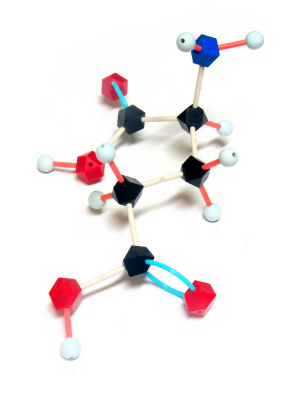Another Blocker of Glutamate Receptor Function with Rapid Antidepressant Effects
Certain drugs such as ketamine and memantine that work by blocking activity at the NMDA receptor for the excitatory neurotransmitter glutamate have antidepressant effects. D-cycloserine is a drug that has a related mechanism and is being studied as an antidepressant. At high doses the drug acts as an antagonist at the glycine site of the NMDA receptor, blocking glycine’s ability to facilitate glutamate transmission through the receptor.
Joshua Kantrowitz, a researcher at Columbia University, reported at a recent scientific meeting that the rapid-onset antidepressant effects of D-cycloserine could be maintained for eight weeks. Similar findings were published in the Archives of General Psychiatry in 2010 and were reported in another study by Uriel Heresco-Levy in a 2013 article in the Journal of Neuropsychopharmacology.
Glutamate is the major excitatory neurotransmitter in the brain and is important for the development of long-term memory. However, glutamate overactivity may contribute to depression. Decreasing this overactivity (with ketamine, memantine, or D-cycloserine) may produce antidepressant effects.
Drugs that Antagonize the Glutamate NMDA Receptor are a New Approach to Antidepressant Treatment
 Several antidepressant drugs work by blocking activity at the NMDA receptor for the excitatory neurotransmitter glutamate. These drugs include intravenous ketamine, a potent NMDA receptor blocker that can produce antidepressant effects within 2 hours of administration, and memantine (Namenda), which is less potent, acts more slowly, and can potentiate the antidepressant effects of lamotrigine and help stabilize mood in patients with treatment-resistant bipolar disorder. Now a drug with a related mechanism, D-cycloserine, has been shown to have antidepressant effects. High doses of the drug act as an antagonist at the glycine site of the NMDA receptor, blocking glycine’s ability to facilitate glutamate transmission through the receptor.
Several antidepressant drugs work by blocking activity at the NMDA receptor for the excitatory neurotransmitter glutamate. These drugs include intravenous ketamine, a potent NMDA receptor blocker that can produce antidepressant effects within 2 hours of administration, and memantine (Namenda), which is less potent, acts more slowly, and can potentiate the antidepressant effects of lamotrigine and help stabilize mood in patients with treatment-resistant bipolar disorder. Now a drug with a related mechanism, D-cycloserine, has been shown to have antidepressant effects. High doses of the drug act as an antagonist at the glycine site of the NMDA receptor, blocking glycine’s ability to facilitate glutamate transmission through the receptor.
Glutamate is the major excitatory neurotransmitter in the brain and is important for the development of long-term memory. However, glutamate overactivity may contribute to depression. Decreasing this overactivity with the drugs noted above appears to produce antidepressant effects.
Uriel Heresco-Levy et al. reported in a 2013 article in the Journal of Neuropsychopharmacology that high doses of D-cycloserine (1000mg/day) had substantially greater antidepressant effects than placebo in a study of 26 patients with treatment-resistant depression. The drug was well tolerated.
Interestingly, low doses of the same drug have a different effect, acting as a partial agonist at the same site, facilitating glutamate transmission and enhancing the new learning that is necessary in cognitive behavioral therapy for anxiety disorders.
Editor’s Note: D-cycloserine requires further study in larger controlled trials, but this small study suggests promise. While ketamine’s effects are rapid in onset, they are also difficult to sustain. This study suggests a possible route to a slower onset with longer-lasting antidepressant effects.


